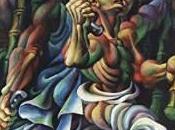
A sud del confine, a ovest del sole
Continuando le mie letture su Murakami e sulla traduzione dei suoi libri, mi sono imbattuta in questo ottimo articolo (consigliatomi da Licia), "The cult of Murakami", di Nicholas Blincoe, nel quale Kazuo Ishiguro, estimatore dichiarato di Murakami, afferma: "Haruki is one of the three or four most exciting and important writers working right now." E poi aggiunge: "Harder to explain just why." Ishiguro, parlando della fusione tra realtà e mito che è tipica di Murakami, dice che, per esempio, anche in un romanzo meno apertamente "fantastico" come A sud del confine, a ovest del sole, "the story blends images from Casablanca with the old Snow Woman legend, very well known to every Japanese person, but perhaps less obvious to Westerners". Poi aggiunge che questo mix accomuna l'autore a "the new Japanese animation, comics or 'Nintendo culture'", e cita lo scrittore Kobo Abe, che a sua volta "combined old Japanese folk tales and bizarre sci-fi".
Nel segno della pecora
Murakami è visto in Giappone come il più occidentale degli autori giapponesi, continua l'articolo, ma non tanto perché le sue opere contengono riferimenti al cinema e alla musica pop dell'Occidente. Come afferma ancora Ishiguro: "The lifestyles of Haruki's characters are probably much more seamlessly modern-Japanese than might appear to Westerners, who are much more conscious of the distinctions between the 'Western' features and the Japanese ones, because the latter spring out to us as unfamiliar and exotic." E aggiunge: "You have to remember that for a Japanese growing up in the post-war era, jazz, rock and Hollywood movies would seem as indigenous as the more traditional stuff. In fact… kabuki, tea ceremonies and the works of Kawabata would come over as the more exotic and alien."
After Dark
E allora da dove arriva quel senso di "occidentalità" che si percepisce nelle opere di Murakami? Dallo stile, prosegue Blincoe, che parla della passione dell'autore per il jazz ("I was listening to jazz for 10 hours a day for several years, so maybe I was deeply influenced by this kind of music – the rhythm, the improvisation, the sound, the style", afferma Murakami) e per la letteratura occidentale: "Moreover (...) since childhood – Murakami read nothing but Western fiction, especially American novels".Questa "occidentalità", prosegue l'articolo, non può essere apprezzata da chi legge i romanzi di Murakami in traduzione. Eppure, sostiene Blincoe, "I am convinced that it remains both the filter and the horizon of his oeuvre: we know it is there, even if we can neither see it, nor judge its extent. This seems clear on the websites, where translation is always the hottest topic of debate." E poi passa a confrontare due dei traduttori in inglese di Murakami, Birnbaum e Rubin (quello che consigliava, come ho raccontato qui, di non leggere libri tradotti): "The movement from Birnbaum, an enthusiast, to Rubin, an academic, could not be more marked. Birnbaum's style is immediate, often catchy and occasionally prickly, with a clear American inflection. (...) Some readers have found a loss of verve in the transition from Birnbaum to Rubin. Certainly, Rubin's style is drier. It seems the truth is (and I am indebted to Rubin's excellent book Haruki Murakami and the Music of Words for airing this topic in detail) that Murakami is new and fresh because his style is unadorned and uninflected."

Underground
L'articolo parla anche del Murakami traduttore, e di come il suo stile sia influenzato dagli autori che sceglie di tradurre: "[Murakami's] style might be the invisible or secret ingredient of his appeal in the West, and one can pick up its vibration in the authors that he chooses to translate. It would be natural to assume that Murakami turned to translation because of money problems. In fact, he was an established author when he produced his first (F. Scott Fitzgerald's My Lost City). This makes the list of writers he chooses to translate all the more significant: Murakami operates from a position of considerable power: he can translate who he wishes, and only if he wishes. His personal pantheon is dominated by Raymond Carver, but also includes John Irving, Truman Capote and Paul Theroux".
Kafka sulla spiaggia
E parlando della traduzione di The Catcher in the Rye fatta da Murakami, il giornalista scrive: "Murakami's version of this classic came out in Japan at the same time as Kafka on the Shore. According to Jay Rubin, the two novels dominated Japan's bookshops for months. The novels have other similarities. Like Holden Caulfield, the eponymous hero of Kafka is a 15-year-old boy. Holden is a child, but he can also be read as a shell-shocked veteran caught in arrested development – as Salinger himself appears to have been by the end of his European tour of duty. And so one can see another echo between Holden and Kafka Tamura: a child, yet also an arrested adult, a baby-boomer doomed to live under the shadow of the war generation."Per finire, ho cercato online, nei forum dedicati a Murakami dai lettori italiani, un confronto tra le traduzioni di Antonietta Pastore e quelle di Giorgio Amitrano, e mi sembra che entrambi i traduttori siano amati dai lettori, chi per un motivo e chi per un altro. Voi avete qualche preferenza?







